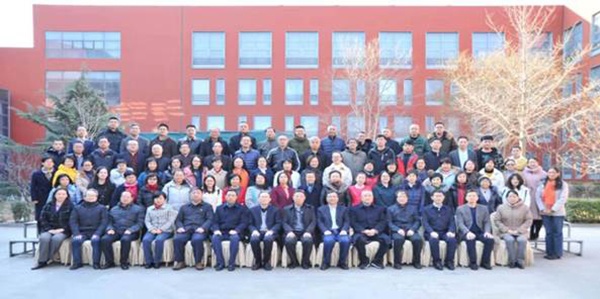 From 11-13 December 2019, the Open University of China (OUC) held the Meeting on Ideological and Political Courses and Core Online Teaching Team in Beijing.
From 11-13 December 2019, the Open University of China (OUC) held the Meeting on Ideological and Political Courses and Core Online Teaching Team in Beijing.
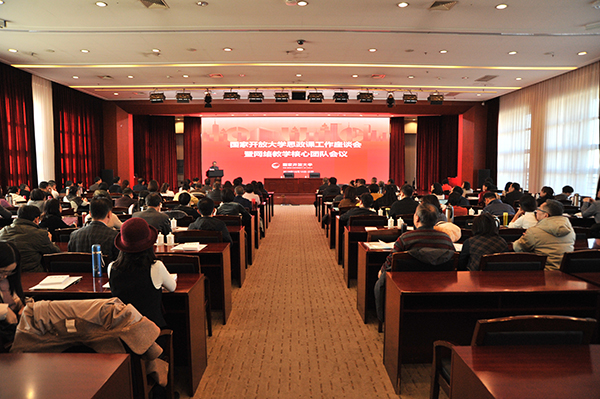
A total of 102 representatives attended the meeting, including leaders from 15 branches of the OUC educational organisation system and responsible persons from Schools of Marxism (Ideological and Political Teaching Center) and people in charge of the core teaching teams of five ideological and political courses from 44 branches. In-depth discussions were held on building a new system for ideological and political education, creating a pattern for “greater ideological and political work,” making efforts to build high-quality ideological and political courses for the OUC, and to make progress for the online teaching teams of ideological and political courses by focusing on putting the fundamental task of fostering virtue through education into effect.
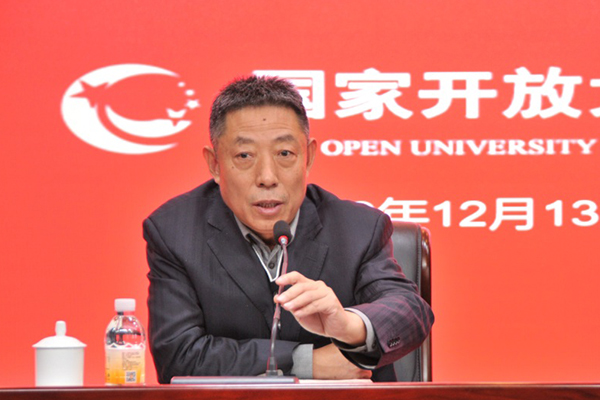
Liu Chen, deputy secretary of the OUC Party Committee, gave a keynote report entitled "Basic Ideas of the OUC on Implementing Several Opinions on Deepening the Reform and Innovation of Ideological and Political Courses in Schools in the New Era". Liu Chen indicated that the OUC, as a new type of university without walls supported by information technology and oriented towards all members of society, is of great importance in educating people for the Party and cultivating talents for the country. In the process of building a learning society where everyone can learn anytime, anywhere, we must work together to give full play to our own characteristics and advantages and make positive efforts by focusing on implementing the fundamental task of fostering virtue through education. The OUC headquarters has completed the construction of a number of high-quality ideological and political courses, and increased the number of courses offered and the credits carried by the courses. A series of policies have been promulgated with the aim of supporting the reintegration of teaching institutions and the teaching teams of ideological and political courses, and remarkable results have been achieved. In the new era, higher requirements have been put forward for ideological and political courses. Liu Chen highlighted the detailed ideas of the OUC’s study and implementation of Several Opinions on Deepening the Reform and Innovation of Ideological and Political Courses in Schools in the New Era from seven perspectives in light of a series of new documents and standards for the construction of the ideological and political courses issued by the Party Central Committee and the CPC Leading Group of the Ministry of Education. The documents and standards clarify the significance and objectives of the construction of ideological and political courses, which are to innovate the construction of the ideological and political course system, to optimise the construction of online teaching resources for ideological and political courses, to strengthen the construction of teaching teams for ideological and political courses, to build a new version of a School of Marxism, to improve the teaching quality of ideological and political courses, and to put in place guarantees for ideological and political course construction.

Deputy secretary Lu Fang from the Zhejiang Branch Party Committee giving a report
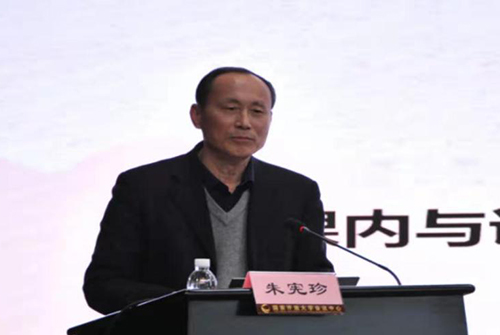
Deputy secretary Zhu Xianzhen from the Shandong Branch Party Committee giving a report
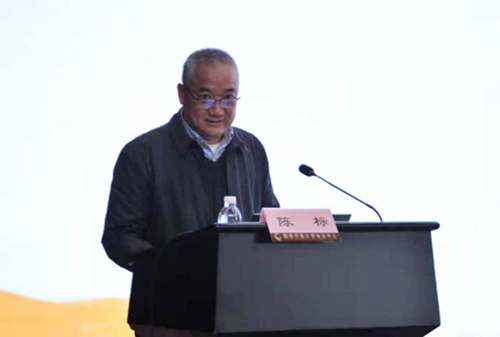
Chen Biao, deputy secretary of the Sichuan Branch and secretary of the Sichuan Branch Discipline Committee, giving a report
Lu Fang, deputy secretary of the Zhejiang Branch Party Committee, gave a report entitled Increasing the Cohesive Coordination of the System to Promote Linkages Inside and Outside the Classroom and the Pluralistic Innovation of Carriers, in which he analysed the construction of the greater ideological and political pattern of "seven-integration in ideology and politics" made by the Zhejiang branch. Zhu Xianzhen, deputy secretary of the Shandong Branch Party Committee, gave a report entitled Creating a Greater Pattern for Educating People through Ideology and Politics in An All-Round Way. Starting with the "four-integration” work model, he shared the Shandong Branch’s experience of educating people through ideology and politics in an all-round way. Chen Biao, deputy secretary of the Sichuan Branch Party Committee and secretary of the Sichuan Branch Discipline Committee, gave a report entitled Thought on and the Practice of Ideological and Political Education and Teaching, in which he shared the Sichuan Branch’s practical experience of ideological and political education and teaching.
Sun Fuwan, executive vice president of the OUC School of Marxism, explained the basic ideas, construction objectives, and future plans for the online teaching team and the social practice and teaching schemes of ideological and political courses in the Open University of China. He gave a series of constructive comments and suggestions on how to gather enough strength to promote the joint action of the system, make top-level design, establish rules and regulations, and conduct management and assessments. Associate Professor Han Yanhui from the Faculty of International Language and Cultures summed up the experience of how the teaching team of Computer Assisted English Teaching and Learning has established a cross-regional one-stop operation.
The Shanxi, Heilongjiang, Guangdong, Hebei, and Gansu branches introduced the highlights of their practical teaching of ideological and political courses and their experience of teaching team construction. These vivid practices have tapped into local resources to increase the effectiveness of ideological and political practice. They have laid a solid foundation for the OUC to shape a strategy of constructing ideological and political courses by unifying the joint action of the system and promoting the progress of the entire system by taking the experience of one school as a guide and exploring a large-scale online ideological and political education work model.
The participants of the meeting were divided into six groups to discuss issues such as how to pool the strength of the system, how to improve the teaching quality of ideological and political courses, and how to further promote reform and innovation. Teachers present felt that they had benefitted a lot from the keynote reports delivered at the meeting and the introduction of the experience of the branches. They fully recognised the three plans submitted at the meeting, including the “OUC Implementation Plan for Several Opinions on Deepening the Reform and Innovation of Ideological and Political Courses in Schools in the New Era,” which they believe are accurate, effective, and have solid measures. The teachers present also put forward a number of suggestions. The first is to strengthen top-level design by integrating centralisation and decentralisation under the overall coordination of the OUC, to arouse the enthusiasm of the grassroots, and to work together to create distinctive OUC brands through large-scale online ideological and political education work. The second is to build a channel for the rapid growth of ideological and political teachers, to put into effect the guiding principles of the Party Central Committee, to mobilise the enthusiasm of teachers by offering policy support for the evaluation of performance and the promotion of professional titles, as well as offering diverse training opportunities and special scientific research topics. The third is to strengthen overall planning, to promote the construction of campus culture, to engage in high-level publicity planning by determining a theme for each year in order to demonstrate the synergy of the system and improve the popularity and reputation of the OUC. The fourth is to establish a resource-sharing platform, to integrate resources by any means possible, to build an online School of Marxism, to create OUC brands by integrating quality branch resources and characteristic courses, and to implement the "going global” strategy.
At the conclusion of the meeting, Liu Chen pointed out that it was an important part of conscientiously studying and putting into effect the guiding principles of General Secretary Xi Jinping's series of important speeches on the construction of ideological and political courses in schools, as well as a way of studying and putting into effect the guiding principles of the documents of the general offices of the Party Central Committee and the State Council on Several Opinions on Deepening the Reform and Innovation of Ideological and Political Courses in Schools in the New Era. It is of great significance in comprehensively implementing the Party’s educational policies, building a new type of educational system for ideological and political courses in open universities, and formulating a pattern for “greater ideology and politics work.” The OUC will sum up and absorb the rational proposals made at the meeting in order to further revise and improve the “OUC Implementation Plan for Several Opinions on Deepening the Reform and Innovation of Ideological and Political Courses in Schools in the New Era,” and promulgate it as soon as possible. The OUC will endeavour to push its ideological and political course construction to a new stage in a down-to-earth manner under the new situation and give play to its own advantages and role in improving China’s lifelong learning system.
By Xuan Hongqin, OUC